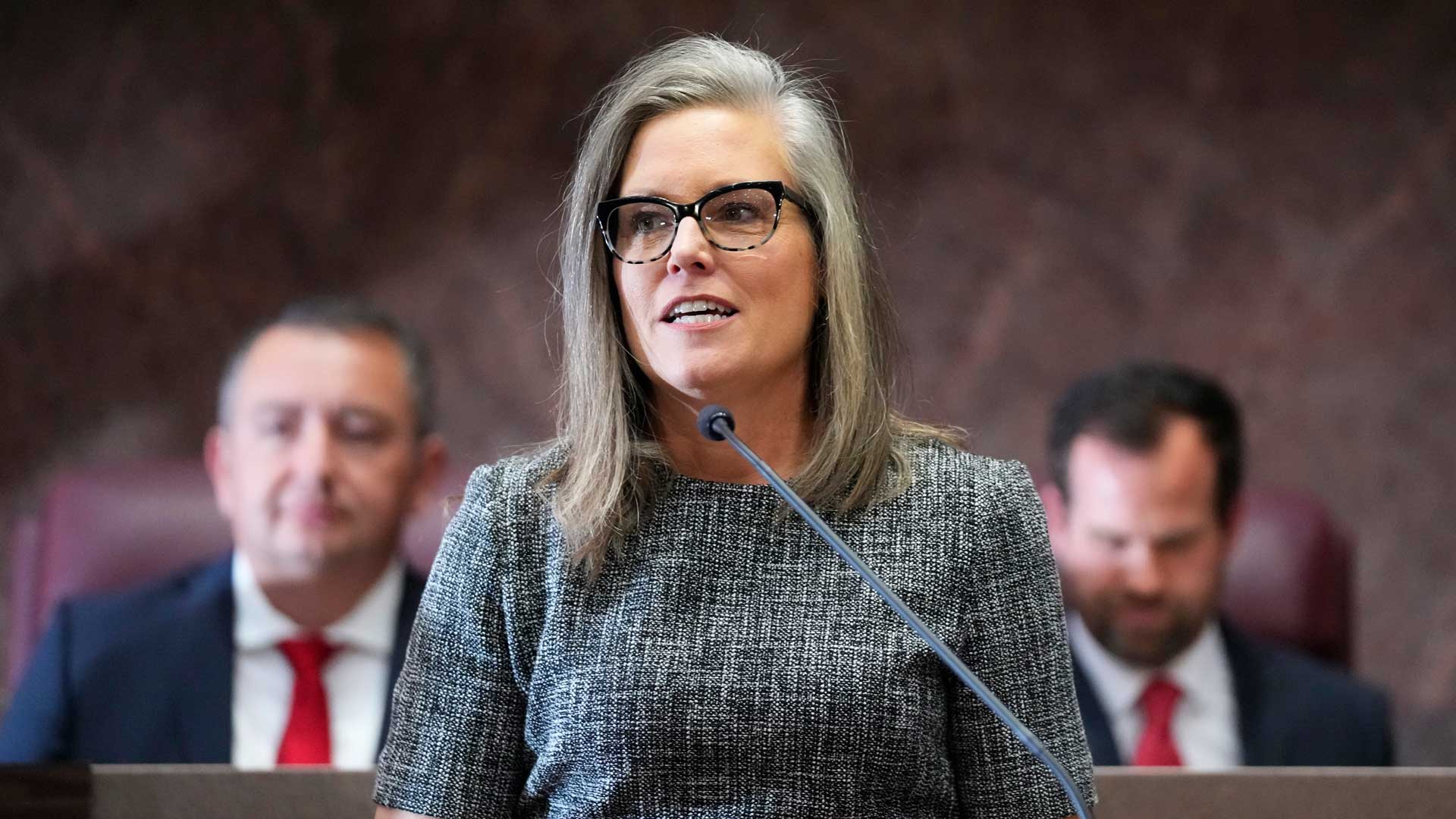 Democratic Arizona Gov. Katie Hobbs, center, is flanked by Arizona House Speaker Ben Toma, R-Glendale, left, and Arizona Senate President Warren Petersen, R-Gilbert, right, at Hobbs' state of the state address at the Arizona Capitol in Phoenix on Jan. 9, 2023.
Democratic Arizona Gov. Katie Hobbs, center, is flanked by Arizona House Speaker Ben Toma, R-Glendale, left, and Arizona Senate President Warren Petersen, R-Gilbert, right, at Hobbs' state of the state address at the Arizona Capitol in Phoenix on Jan. 9, 2023.
A lawsuit that alleged Arizona Gov. Katie Hobbs exceeded her power in refusing to execute a prisoner earlier this year has been dismissed at the request of attorneys on both sides of the case.
The lawsuit dismissed Thursday had tried unsuccessfully to force the Democratic governor, who had ordered a review of Arizona’s death penalty protocols because of the state’s history of mismanaged executions, to carry out the execution of Aaron Gunches for his murder conviction in the 2002 killing of Ted Price.
Hobbs has vowed to not carry out any death sentences until there is confidence the state can do so without violating the law. Democratic Attorney General Kris Mayes’ office has said it wouldn’t seek any court orders to execute prisoners while the governor’s review of death penalty procedures is underway.
In the weeks leading up to the April 6 execution date set for Gunches by the state’s highest court, Hobbs’ office also maintained the state wasn’t prepared to enforce the death penalty, saying it lacked staff with the expertise to carry out executions, was unable to find an IV team to carry out the lethal injection and didn’t have a contract with a pharmacist to compound the pentobarbital needed for an execution.
But a dismissal agreement filed earlier this week by attorneys on both sides of the lawsuit provided an update on the state’s readiness to enforce death sentences. It said the state has had staff in place to carry out executions as of May 5 and will look for a compounding pharmacist.
Maricopa County Attorney Rachel Mitchell, the top prosecutor for metro Phoenix who along with two of Price’s relatives had filed the lawsuit against Hobbs, said the civil case was resolved because it answered the question of whether the state was prepared to carry out another execution.
Still, Mitchell left open the possibility that she would ask a court in the future to let her seek execution warrants, which are normally requested by the Attorney General’s Office.
While lawyers for Hobbs have said only the attorney general can seek a warrant of execution, Mitchell said there was no case law saying only the attorney general could request such a court order.
“I am hopeful that this will get resolved by the governor’s office quickly, keeping in mind what the victims are going through and hopefully they get back to business as usual. If that doesn’t happen, we will have to explore other options” including asking a court to let her seek execution warrants, Mitchell said.
The governor’s office and Colleen Clase, an attorney representing sister Karen Price and daughter Brittney Kay in the lawsuit, didn’t immediately respond to a request for comment on Thursday.
On the day that the Gunches’ execution warrant was set to expire, the lower-court judge presiding over the lawsuit said he couldn’t issue or extend the order. The warrant expired without Gunches being executed.
Gunches had pleaded guilty to a murder charge in the shooting death of Ted Price, who was his girlfriend’s ex-husband, near the Phoenix suburb of Mesa.
Arizona, which currently has 110 prisoners on death row, carried out three executions last year. That followed a nearly eight-year hiatus brought on by criticism that a 2014 execution was botched and because of difficulties obtaining execution drugs.
Since then, the state has been criticized for taking too long to insert an IV for lethal injection into a condemned prisoner’s body and for denying the Arizona Republic permission to witness the three executions.
No executions are currently scheduled in Arizona.

By submitting your comments, you hereby give AZPM the right to post your comments and potentially use them in any other form of media operated by this institution.